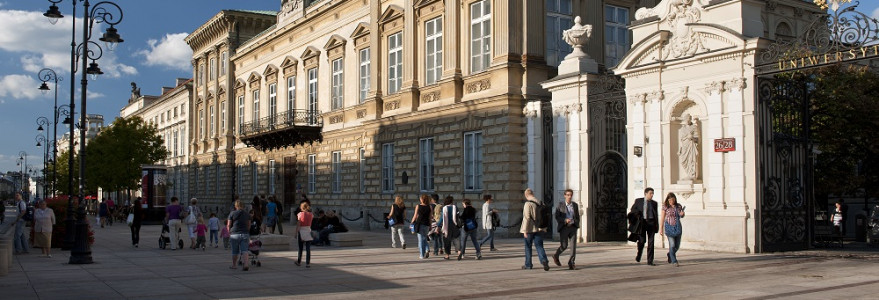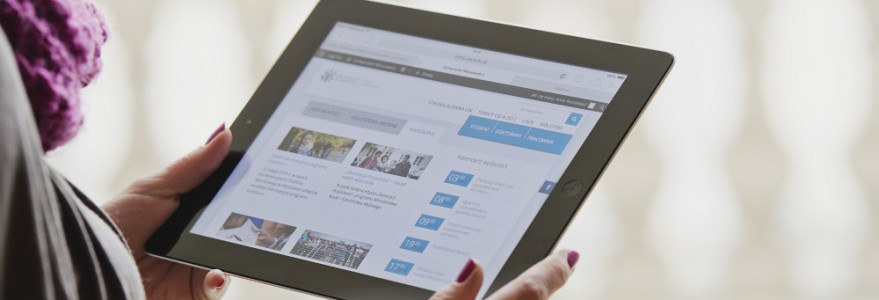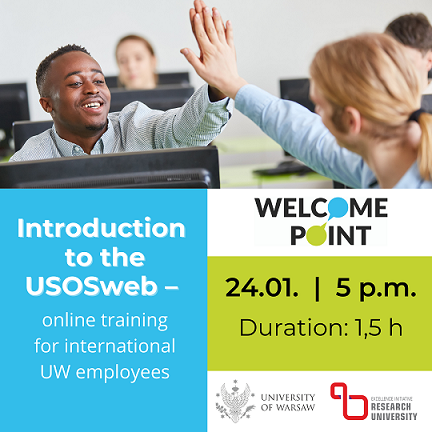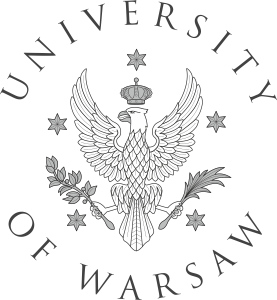Opening for the PhD student in Bioinformatics
04 lutego 2022PhD student in Bioinformatics as a PhD student under the Polish-Chinese Sheng research project 2021/40/Q/NZ2/00078 „Integrative methods for modeling protein-protein complexes and multimolecular assemblies” financed by the National Science Center. Project manager: dr hab. Sebastian Kmiecik, prof. ucz. Number of positions: 1. Deadline for applications: 10 March 2022. For more info see >> pdf
Opening for the Bioinformatics Postdoc
Bioinformatics Postdoc as a Bioinformatics Postdoc under the Polish-Chinese Sheng research project 2021/40/Q/NZ2/00078 „Integrative methods for modeling protein-protein complexes and multimolecular assemblies” financed by the National Science Center. Project manager: dr hab. Sebastian Kmiecik, prof. ucz. Available positions: 2. Deadline for applications: 10 March 2022. For more info see >> pdf
Opening for the PhD student in Bioinformatics
PhD student in Bioinformatics as a PhD student under the OPUS project 2020/39/B/NZ2/01301 entitled „Development of tools for the rational design of peptide therapeutics” financed by the National Science Centre, Poland, is open for application. Project leader: dr hab. Sebastian Kmiecik, prof. ucz. Number of positions: 1. Deadline for applications: 10 March 2022. For more info see >> pdf
Opening for the Bioinformatics Postdoc
Bioinformatics Postdoc as a Bioinformatics Postdoc under the OPUS project 2020/39/B/NZ2/01301 entitled „Development of tools for the rational design of peptide therapeutics” financed by the National Science Centre, Poland, is open for application. Project leader: dr hab. Sebastian Kmiecik, prof. ucz. Available positions: 2. Deadline for applications: 10 March 2022. For more info see >> pdf
4EU+ Alliance online courses
28 stycznia 2022
In the summer semester 2021/2022, online courses organised by 4EU+ member universities will be available for students and doctoral candidates. The courses are conducted by Charles University in Prague, the University of Milan, and Sorbonne University. The registration is open now.
In the summer semester 2021/22, five 4EU+ Alliance member universities (the University of Warsaw, Charles University, Sorbonne University, Heidelberg University and the University of Milan) will make their online courses available to all 4EU+ students and doctoral candidates.
Courses by 4EU+ partner universities
Advanced Bioinformatics in Biotechnology by the University of Milan, History of Linguistics by Charles University, or COVID-19 Crisis as a Model for Data Literacy – any student or doctoral candidate can take part in a course conducted by academics from five European universities:
- Sorbonne University (list of courses and registration procedure >>). Some of the courses started on 17th January. The enrolment will still be open after the launch of the classes, according to availability;
- University of Milan (list of courses and registration procedure >>). March courses registration open until 20th February. April courses registration open from 21st February until 25th March;
- Charles University in Prague (list of courses and registration procedure >>). Registration open until 11th February.
In March or April, the course catalogue of Heidelberg University will be published.
UW courses for foreign students and doctoral candidates
The University of Warsaw offers summer courses in 2021/2022 for 4EU+ students and doctoral candidates.
The courses cover three 4EU+ flagships:
Flagship 2 “Europe in a changing world: Understanding and engaging societies, economies, cultures and languages”;
Flagship 3 “Transforming science and society: Advancing information, computation and communication”;
Flagship 4 “Biodiversity and sustainable development”.
The course offer also includes: Protection of Underwater Cultural Heritage, Archaeology of War in Ancient World, History of Language and Lexicography, Use of i-Tree Tools in Urban Greenery Management.
Registrations started on 24th January and last till 20th February. The number of participants is limited.
The UW enrolment guide is available on >>
UW students and doctoral candidates can register by their USOS account. It is recommended to check if the registration is open within a particular group of recipients.
Before taking a course offered by an Alliance partner university, the student should sign a 4EU+ Learning Agreement in his/her Faculty/Unit. LA form >>
For any questions concerning the 4EU+ shared online courses, please contact: 4euplus.mobility(at)uw.edu.pl.
Source: www.en.uw.edu.pl
COVID-19 tests until 31st March
20 stycznia 2022
Employees and doctoral candidates of the University of Warsaw can book free of charge COVID-19 RT-PCR tests until 31st March.
Employees and doctoral candidates have an opportunity to undergo COVID-19 RT-PCR tests that detect active SARS-COV-2 infection.
Testing takes place on-site (on the campus in Ochota) following the registration.
SARS-CoV-2 RT-PCR detects viral RNA. Diagnostic tests use a mucus sample from the nose or throat. Medical personnel take a swab which will get analysed by Warsaw Genomics.
Before getting tested:
At least half an hour before taking a swab for SARS-CoV-2 virus, one should not:
- drink,
- eat,
- smoke cigarettes,
- take medications,
- brush their teeth,
- rinse mouth and nose,
- chew gum.
Testing period: COVID-19 swab collection will continue until 31st March 2022.
How to book a test?
Step 1: Download a discount code
A discount code, which entitles employees and doctoral candidates of the University of Warsaw to get tested free of charge, can be downloaded from covid.uw.edu.pl.
Step 2: Register
After receiving the code, register at https://warsawgenomics.pl/badaniadlauw and arrange an appointment via the form at warsaw-genomics.reservio.com, choosing a specific date and time.
Step 3: Undergo a test
Taking a swab will take place on the campus in Ochota, in the building of the Sports and Recreation Centre, in a separate room with a separate entrance. Tests are organised and coordinated by the University of Warsaw. Swabs will be collected by medical professionals.
Warsaw Genomics team will offer tests from Monday to Friday: 8 am – 6 pm.
Please note: A person should come to the swab collection facility wearing a protective mask on, with their ID and test order number, which will be generated during registration.
Step 4: Get your results
The test results will be available to patients at https://wyniki.warsawgenomics.pl/. It can take up to three business days until the results will be given. One should enter their order number (from the e-mail confirming acceptance of the SARS-CoV-2 test) and their PESEL number (or their ID number if there is no PESEL number). It will be possible to download the signed and authorized test result.
Discount on RT-PCR test for family members of UW employees and doctoral candidates
UW employees and doctoral students who will get tested can receive a discount from WARSAW GENOMICS for 4 RT-PCR tests to be used by their family members. The reduction amounts to PLN 89, and the cost of the test for a family member is PLN 350. Family members (max. 4) can use the discount by booking a test at: https://warsawgenomics.pl/zlecam-test-sars.
How to get a discount code for family members?
The discount code will be sent by Warsaw Genomics by e-mail, confirming registration for the free RT-PCR test for active SARS-CoV-2 coronavirus infection.
More information (in Polish) >>
Source: www.en.uw.edu.pl
Dr Katarzyna Bandyra awarded the EMBO Installation Grant
19 stycznia 2022
“Mitochondria are essential organelles that provide cellular metabolic power through oxidative phosphorylation necessary for the organism to function and reproduce. In human, any malfunction of these organelles results in various disorders,” says Dr Katarzyna Bandyra from the Faculty of Chemistry, and the Biological and Chemical Research Centre, University of Warsaw. As an EMBO Installation Grantee, Dr Bandyra will research the role of PNPase in human mitochondria.
More than 1,800 leading life scientists are members of the international European Molecular Biology Organisation. The major goals of the organization are to support talented researchers at all stages of their careers, stimulate the exchange of scientific information, and help build a European research environment where scientists can achieve their best work.
EMBO Installation Grants support group leaders establishing independent laboratories in countries participating in the scheme to strengthen the life sciences there. Recipients of an Installation Grant are integrated into the EMBO Young Investigator Network. As a result, they benefit from the extensive networking opportunities and practical support. Grants are available in the Czech Republic, Poland, Portugal and Turkey.
Names of life scientists awarded EMBO Installation Grants were announced on 19th January. Dr Katarzyna Bandyra from the Faculty of Chemistry, and the Biological and Chemical Research Centre, University of Warsaw, is one of the six grantees. In her research she investigates protein complexes by cryo-electron microscopy.
PNPase in human mitochondria
Dr Bandyra has received the Installation Grant for her project under the title “Towards understanding of the mitochondrial RNA transport and metabolism”. The aim of the project is to understand the role and function of the mitochondrial enzyme PNPase in humans.
According to Dr Bandyra “Mitochondria are essential organelles that provide cellular metabolic power through oxidative phosphorylation necessary for the organism to function and reproduce. In human, any malfunction of these organelles results in various disorders, such as neoplasm, neurodegeneration or inflammation”.
Due to the limited coding capacity of their genomes, mitochondria have evolved mechanisms to import nucleus-encoded proteins required to support their activities. One such protein in humans is hPNPase, a highly conserved exoribonuclease residing mostly in the mitochondrial intermembrane space, where its function is poorly understood. Bacterial PNPase, which is a close homologue of the human enzyme, was recently shown to switch activity from an RNA degradation mode to a stabilising role for specific types of RNA when complexed with an RNA chaperone. As the human and bacterial enzymes are highly similar in sequence and structure, it is possible that hPNPase could have a dual mode of action as well, and could participate in RNA-mediated processes once trapped in the non-degradative assembly.
“The research I would like to undertake will address why hPNPase is present in the intermembrane space of the human mitochondria and identify the functional roles played by the enzyme in that compartment. I will characterise the full-length enzyme biochemically and structurally, and investigate its capacity to bind substrates in the degradative and non-degradative modes. Subsequently, I will search for PNPase protein partners and RNA substrates using complementary pull-down and fractionation techniques in order to identify potential hPNPase ternary complexes,” explains Dr Bandyra.
The study results will illuminate the biological role of PNPase in human cells and determine if the enzyme is competent to act in hypothetical, long-disputed mitochondrial RNA trafficking system. “In the future I would like to investigate crucial protein-RNA complexes critical for human health, and will use cryo-EM as one of the main research tools to elucidate the structures of such assemblies,” says the grantee.
The project “Towards understanding of the mitochondrial RNA transport and metabolism” started in January to be completed within three to five years. Dr Katarzyna Bandyra has received funding of € 50,000 per year. She has also become part of the EMBO Young Investigator Network to gain access to a range of training and networking opportunities.
The list of the EMBO Installation Grantees is available online >>
Dr Katarzyna Bandyra graduated from the University of Warsaw majoring in molecular biology. She completed her PhD studies at the University of Cambridge. In 2021, she came back to Poland with Marie Skłodowska Curie Actions Widening Fellowship (Horizon 2020) as well as POLS and SONATA grants (NCN and Norway Grants) to investigate her own project using cryo-EM and to help Polish scientists to implement this method in their research. Her research focuses on RNA, its versatility and functionality, as well as on RNA-binding proteins.
Source: www.en.uw.edu.pl
Introduction to the USOSweb – online training
12 stycznia 2022
Employees using the system are invited to an introductory training course on the basics of USOSweb. The training will be conducted on 24th January.
The course will cover the basic principles of functioning of the USOSweb system. Especially academic teachers, yet any UW employee using the system is invited to participate. The training will be carried out by Dr Mateusz Kopyt from the UW Faculty of Economic Studies.
Registration and training information
The online registration form is available on the Kampus Platform. In order to sign up, a CAS account is necessary. The application deadline expires on 19th January at 15.00. Due to IDUB funding requirements, if the number of participants is insufficient, a group will not be formed.
The one-day course is intended for foreign employees of the University of Warsaw based on a contract of employment, especially academics. Individuals who meet these conditions will be accepted in the order of registration on the platform. The registration is tantamount to a commitment to participate in the training. Information on the results of the recruitment will be provided after the verification of applications and after the deadline.
The training starts on 24th January from 17.00 to 18.30, with English as a language of instruction and ZOOM as a video platform for communication. Link will be emailed to all registered participants.
More details are provided on Welcome Point’s website, or at email: welcome.event(at)uw.edu.pl
Course implemented under Action II.2.3. “Support of the relocation process of employees from abroad by introducing solutions facilitating involvement of new foreign employee to work at UW and preparation to stay in Poland” of the Excellence Initiative – Research University (IDUB) at the University of Warsaw.

Źródło: www.en.uw.edu.pl
PhD student position offer in molecular and RNA biology
PhD student position offer in molecular and RNA biology in the OPUS project „IFIT proteins in the regulation of inflammatory responses” of Dr Maria Górna. We are looking for a PhD student to work in the project #2021/41/B/NZ2/02708 on the role of IFIT2 complexes in the immune regulation in macrophages. The project aims to discover post-transcriptional mechanisms that regulate expression of cytokines at the first contact of immune cells with a pathogen. Our findings may have an impact on the diagnosis and treatment of autoimmune diseases or acute inflammatory reactions such as the „cytokine storm” accompanying COVID-19 morbidity. Deadline for applications: 16 January 2022. For more info see >> pdf
PhD student position offer in molecular and RNA biology
PhD student position offer in molecular and RNA biology in the OPUS project „IFIT proteins in the regulation of inflammatory responses” of Dr Maria Górna. We are looking for a PhD student to work in the project #2021/41/B/NZ2/02708 on the role of IFIT2 complexes in the immune regulation in macrophages. The project aims to discover post-transcriptional mechanisms that regulate expression of cytokines at the first contact of immune cells with a pathogen. Our findings may have an impact on the diagnosis and treatment of autoimmune diseases or acute inflammatory reactions such as the „cytokine storm” accompanying COVID-19 morbidity. Deadline for applications: 14 February 2022. For more info see >> pdf

